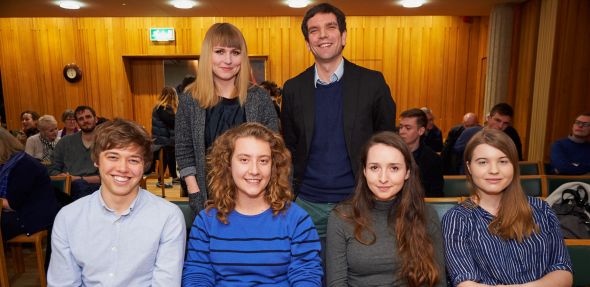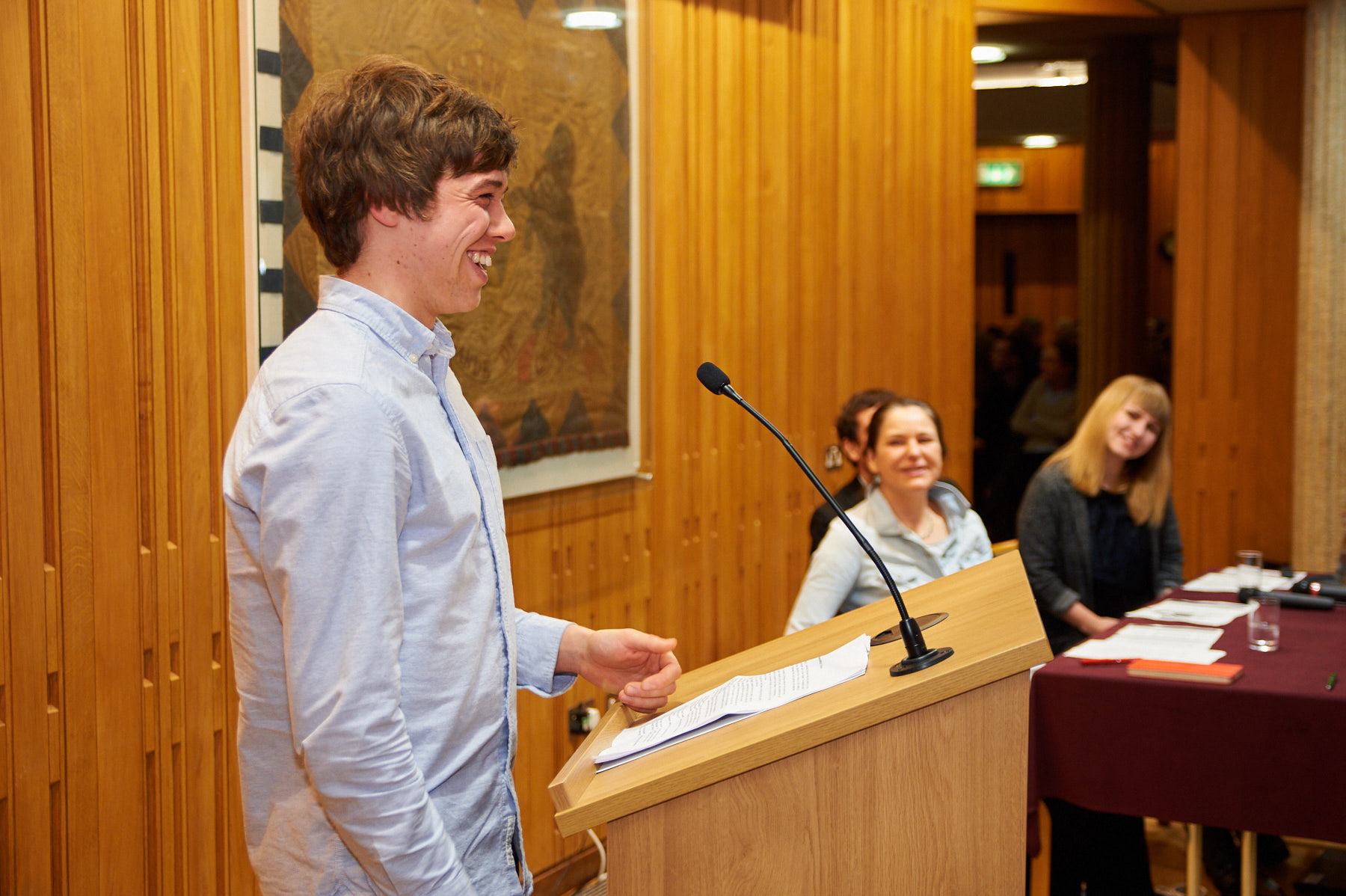
Polish writer Dorota Masłowska and Lecturer in Polish Studies at the University of Cambridge Stanley Bill (back); prize winners of the Talkman Prize in Literary Translation 2017 (front, from left to right): Cameron Holloway (1st), Polly Harlow, Claire Conway, Celia Dyson.
Over the last three years, we have been very proud to conduct a competition for Cambridge students to translate Polish literature into English. Thanks to the kind sponsorship of Talkman Language Solutions, the first prize in the competition has been a summer school course in Polish language and culture at the Jagiellonian University in Kraków. This year's winner was Cameron Holloway, who read his winning translation at an event with celebrated Polish writer Dorota Masłowska. In previous years, the prize has been presented by Olga Tokarczuk and Adam Zagajewski. The judge of the prize is acclaimed translator Antonia Lloyd-Jones.
Cameron Holloway has written a brief account of his time in Kraków this summer.
Three Weeks in Kraków
by Cameron Holloway
The day after graduating, I boarded a plane to Kraków, bleary-eyed but excited for my first visit to Poland. I would be studying at a summer school run by the Jagiellonian University (a university almost as old as Cambridge), which counts among its alumni Nicolaus Copernicus and Pope John Paul II.
I made an inauspicious start to the trip, accidentally placing my passport in my hold luggage, which led to lengthy negotiations with Polish border security, providing an early chance to test out my Polish language as I attempted to chat with the surly security officer who escorted me for half an hour whilst I retrieved my passport. After a surprisingly straightforward bus ride, I arrived in Kraków. I tried to buy a bread roll (bułka), a simple task you might think. But even this proved beyond me, as I was presented with a bag of breadcrumbs (which, it turns out, is called bułka tarta), and in a slightly confused state, unwittingly accepted, leaving me 3 zloty worse off and still with no edible sustenance.
These minor hiccups overcome, it was time for classes to start. Everyone else on the courses seemed to have some form of Polish family, and were amazed to discover that I should pick such a difficult (and slightly obscure) language out of choice. My class of thirteen encompassed eleven different nationalities, and an age range of 19 - 69. We had two excellent teachers, and I was constantly impressed with their energy and enthusiasm given the difficulty of teaching the same two classes every day for three weeks. The four hours of language teaching a day, plus the opportunity to use what I had learnt whilst exploring the city in afternoons and evenings, meant that my speaking progressed quickly, and it was very rewarding to see the big improvement I made over the three weeks.
There were also classes in grammar, literature, and history in the afternoons, although I must admit I missed many of these in order to explore the city and attempt to use my Polish in real-life situations. The area surrounding Kraków includes some beautiful countryside, and I particularly enjoyed going for runs along the river, or up to the Kościuszko and Piłsudski mounds, where my efforts were rewarded with fantastic views across the city and surrounding area, as well as the added bonus of explanatory placards to allow me to recap some of the history I had learnt as part of the Polish Studies course at Cambridge. I enjoyed a tour of the stunning Wawel Castle, especially the fire-breathing dragon statue, which was still active even in the torrential downpour which hit midway through the tour. The National Museum and Galicia Museum of Jewish History were also excellent, and my basic knowledge of Polish history from the course at Cambridge came in handy as a starting point from which to expand my knowledge on a variety of topics, from 20th-century art to the Holocaust. There was also the opportunity to visit Auschwitz-Birkenau, which was an unforgettable and incredibly moving experience, one I am glad I had even if it was horrible at the time. On a lighter note, an evening of traditional Polish dancing was another cultural highlight, and an excellent chance for everyone to embarrass themselves and have lots of fun.
Overall ,the course at the Jagiellonian University provided a really good balance of language-learning and cultural experiences, and was extremely well-organised. I learnt a lot of Polish, met lots of friendly and interesting people, and had a great time. It was also very useful to be given textbooks as part of the course, which gives me an easy way to continue my studies of Polish independently. I will definitely be returning to Kraków sooner rather than later. A huge thank you to Cambridge Polish Studies and Talkman Language Solutions for giving me this fantastic opportunity, I would thoroughly recommend it to anyone else.

Cameron Holloway reading from his winning translation at the presentation of the Talkman Prize for Literary Translation, Sidney Sussex College, Cambridge.




